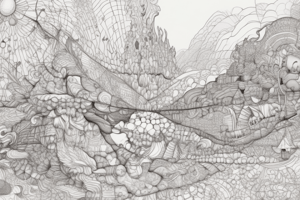Podcast
Questions and Answers
What does correlation analysis measure in psychology?
What does correlation analysis measure in psychology?
- The variability within a single variable
- The effect size in experimental design
- The strength and direction of the relationship between two continuous variables (correct)
- The relationship between dependent and independent variables
Which statistical technique helps researchers predict the value of the dependent variable based on the independent variable(s)?
Which statistical technique helps researchers predict the value of the dependent variable based on the independent variable(s)?
- ANOVA
- Sampling methods
- Experimental design
- Regression analysis (correct)
What does a correlation coefficient of -1 indicate?
What does a correlation coefficient of -1 indicate?
- No relationship
- A perfect negative relationship (correct)
- A perfect positive relationship
- A weak negative relationship
Which correlation coefficient is commonly used in correlation analysis?
Which correlation coefficient is commonly used in correlation analysis?
In regression analysis, what are the independent variables used to estimate?
In regression analysis, what are the independent variables used to estimate?
What is the primary role of statistics in psychology?
What is the primary role of statistics in psychology?
What is the purpose of ANOVA in psychology?
What is the purpose of ANOVA in psychology?
Which type of sampling method guarantees that every member of the population has an equal chance of being selected?
Which type of sampling method guarantees that every member of the population has an equal chance of being selected?
What is the main purpose of experimental design in psychology?
What is the main purpose of experimental design in psychology?
In sampling methods, what does non-probability sampling not guarantee?
In sampling methods, what does non-probability sampling not guarantee?
What does regression analysis help in psychology?
What does regression analysis help in psychology?
Which statistical technique is used to compare the means of two or more groups in psychology?
Which statistical technique is used to compare the means of two or more groups in psychology?
What is the primary purpose of correlation analysis in psychology?
What is the primary purpose of correlation analysis in psychology?
Which type of sampling method does not guarantee every member of the population an equal chance of being selected?
Which type of sampling method does not guarantee every member of the population an equal chance of being selected?
What is the purpose of regression analysis in statistics?
What is the purpose of regression analysis in statistics?
Which type of statistical technique is used to observe the effects of controlled and manipulated variables on the outcome variable?
Which type of statistical technique is used to observe the effects of controlled and manipulated variables on the outcome variable?
Flashcards are hidden until you start studying
Study Notes
Statistics in Psychology
Statistics plays a crucial role in psychology as it helps researchers to make sense of the data collected through various research methods. The application of statistics in psychology is essential for drawing conclusions from the collected data and understanding the relationships between variables. In this article, we will explore five key statistical concepts in psychology: correlation analysis, regression analysis, sampling methods, ANOVA, and experimental design.
Correlation Analysis
Correlation analysis is a statistical technique that measures the degree of relationship between two continuous variables. It helps researchers determine the strength and direction of the relationship between two variables. Correlation coefficients such as Pearson's r, Spearman's rho, and Kendall's tau are commonly used in correlation analysis. A correlation coefficient of +1 indicates a perfect positive relationship, a correlation coefficient of -1 indicates a perfect negative relationship, and a correlation coefficient of 0 indicates no relationship.
Regression Analysis
Regression analysis is a statistical technique used to estimate the relationship between a dependent variable and one or more independent variables. It helps researchers predict the value of the dependent variable based on the value of the independent variable(s). Regression analysis can be used for both linear and non-linear relationships between variables. It is widely used in various fields, including psychology, for predicting, explaining, and controlling phenomena.
Sampling Methods
Sampling methods are used to select a subset of individuals from a larger population for statistical analysis. There are two main types of sampling methods: probability sampling and non-probability sampling. Probability sampling methods, such as simple random sampling, systematic sampling, stratified sampling, and cluster sampling, ensure that every member of the population has an equal chance of being selected. Non-probability sampling methods, such as convenience sampling, snowball sampling, and quota sampling, do not guarantee that every member of the population has an equal chance of being selected.
ANOVA (Analysis of Variance)
ANOVA (Analysis of Variance) is a statistical technique used to compare the means of two or more groups. It helps researchers determine if there is a significant difference between the means of the groups. ANOVA is commonly used in psychology to compare the means of different groups on a particular variable, such as the difference in IQ scores between different age groups.
Experimental Design
Experimental design is a systematic approach to planning and conducting research studies. It involves designing the study, selecting the sample, collecting data, and analyzing the data using statistical techniques. Experimental design is crucial in psychology as it helps researchers establish cause-and-effect relationships between variables. It involves controlling and manipulating variables to observe their effects on the outcome variable.
In conclusion, statistics is an essential tool in psychology, helping researchers to make sense of the data collected through various research methods. Correlation analysis, regression analysis, sampling methods, ANOVA, and experimental design are just a few of the many statistical concepts used in psychology to draw conclusions from data and understand the relationships between variables.
Studying That Suits You
Use AI to generate personalized quizzes and flashcards to suit your learning preferences.




